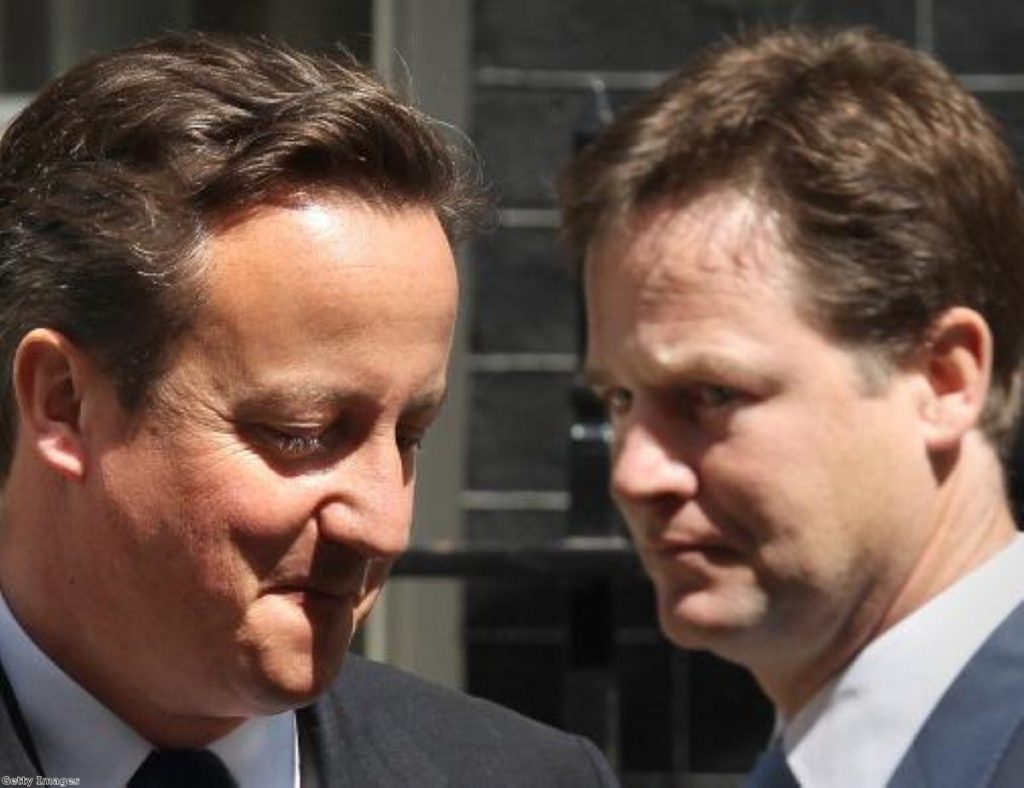There goes the election: Tory majority hopes shrivel after boundary change defeat
Liberal Democrat government ministers have combined with the opposition to defeat the Conservatives' favoured boundary changes, in what is being viewed as a massive blow to coalition unity.
The Commons voted by 334 to 292 to accept a Lords amendment opting to delay the redrawing of the electoral map until the 2020 general election.
It means David Cameron's prospects of winning an overall majority in 2015 have suffered a severe blow, as the reduction of the size of the Commons from 650 to 600 MPs would have handed the Tories an advantage of around 20 seats.
Lib Dems withdrew their support for the reform after Tory backbenchers made the Lib Dems' favoured Lords reform proposals impossible to achieve.


With Labour backing the Lib Dems, the Tories could only hope to win the close vote by buying the support of the nationalist and Northern Ireland parties.
Westminster had been awash with rumours the DUP could be won over to back the Tories in return for a promise of a new airport, but these were scotched when Nigel Dodds tweeted: "The DUP will be voting in the Boundary debate against the reduction of NI seats from 18 to 16."
Despite attempts to secure a deal no arrangement was reached, resulting in a comfortable majority for the rebels.
Exchanges in the Commons were markedly bitter on the government benches. Former Labour minister Jack Straw was forced to withdraw a remark calling leader of the House Andrew Lansley "a tad disingenuous". Shadow justice secretary Sadiq Khan complimented Lansley's "poker face" as the leader of the House argued the reforms were for the good of voters.
"It is not a pick and mix menu. It is an agreement," Lib Dem spokesperson John Thurso said of the original coalition deal during the debate.
"I agreed to the boundary changes, although on many parts with a heavy heart, but in the knowledge the rest of that agreement, especially for my part Lords reform, acted as a counterweight."
He concluded by suggesting to Tory colleagues the peers they had fought to save from reform were to blame for the change.
"I would just gently point out to my friends on these benches, in the mildest manner possible, that they've got what they wanted: the great, the good, the wise, the academic, the apolitical, the ex-public servants and the generals, who they strove so hard to protect, have come together in their wisdom and given us amendment five."
Minutes before the vote, Conservative backbencher Peter Bone said Lib Dem ministers faced a stark choice as they prepared to rebel against their own government.
"The only honourable thing the Liberal Democrats can do tonight, when they do not vote with the Conservative members, is they should resign from the government and cross the floor of the House," he said.
"If they have any principle, any honesty, that is what they have to do."
A number of Tory backbenchers who would lose their seat under the proposed changes also rebelled, including David Davis, Andrew Percy, Andrew Bridgen, Glyn Davies, Philip Davies, Richard Shepherd and John Baron.
Davies tweeted earlier: "Heading into the House of Commons for most difficult day of my Parliamentary career. Looking forward to putting poison behind me."
Despite facing defeat, Cameron and co pressed ahead with the vote in order to force the Lib Dems to make a stand against them. Conservatives will accuse them at the next general election of having refused to back cuts in the number of politicians while supporting the coalition's broad range of public sector spending cuts.
The vote, which took place as the Commons debates Lords amendments to the electoral registration and administration bill, will deepen already intense bitterness on the government backbenches over the coalition's stalled constitutional reform agenda.
"Lib Dem position on boundary changes is deeply dishonourable," former defence secretary Liam Fox tweeted before today's debate. "They can't keep their side of coalition bargain -who will trust them again?"
Deputy prime minister Nick Clegg announced his party's intention to block boundary changes, thought to be worth around 20 MPs to the Tory party at the next election, as a direct response to the failure of his plans to make the Lords reform a mainly elected second chamber.
Many Tory party activists refused to believe the Lib Dems would go ahead with the threat during last autumn's party conference season, but are now being forced to confront the coalition's junior party intransigence on the issue.
They claim boundary changes was introduced as a quid pro quo for the May 2011 referendum on electoral reform, in which the public rejected the alternative vote system by a ratio of two votes to one.
Last week Clegg told the House magazine: "I've always been very open about the fact that a coalition, by definition, is a package deal.
"When one side doesn't honour their side of the deal, then I think it's perfectly reasonable for the other side to say there are adjusting the terms of that deal.
"So the Liberal Democrats have said that boundary changes shouldn't then come in until after 2015. I think Tuesday's vote will draw a line under it and we can all move on."
Clegg's hope may be undermined by the legislation he helped steer through parliament, however. Under the terms of the Act the Commons must hold a vote choosing to either reject or accept the redrawn electoral map proposed by boundary commissioners.
That motion will still be tabled and a separate vote will have to take place in October this year, politics.co.uk understands. Commons business managers could choose not to contest the Lib Dem whips' attempt to defeat the motion, however, thereby avoiding another divisive clash this autumn.









